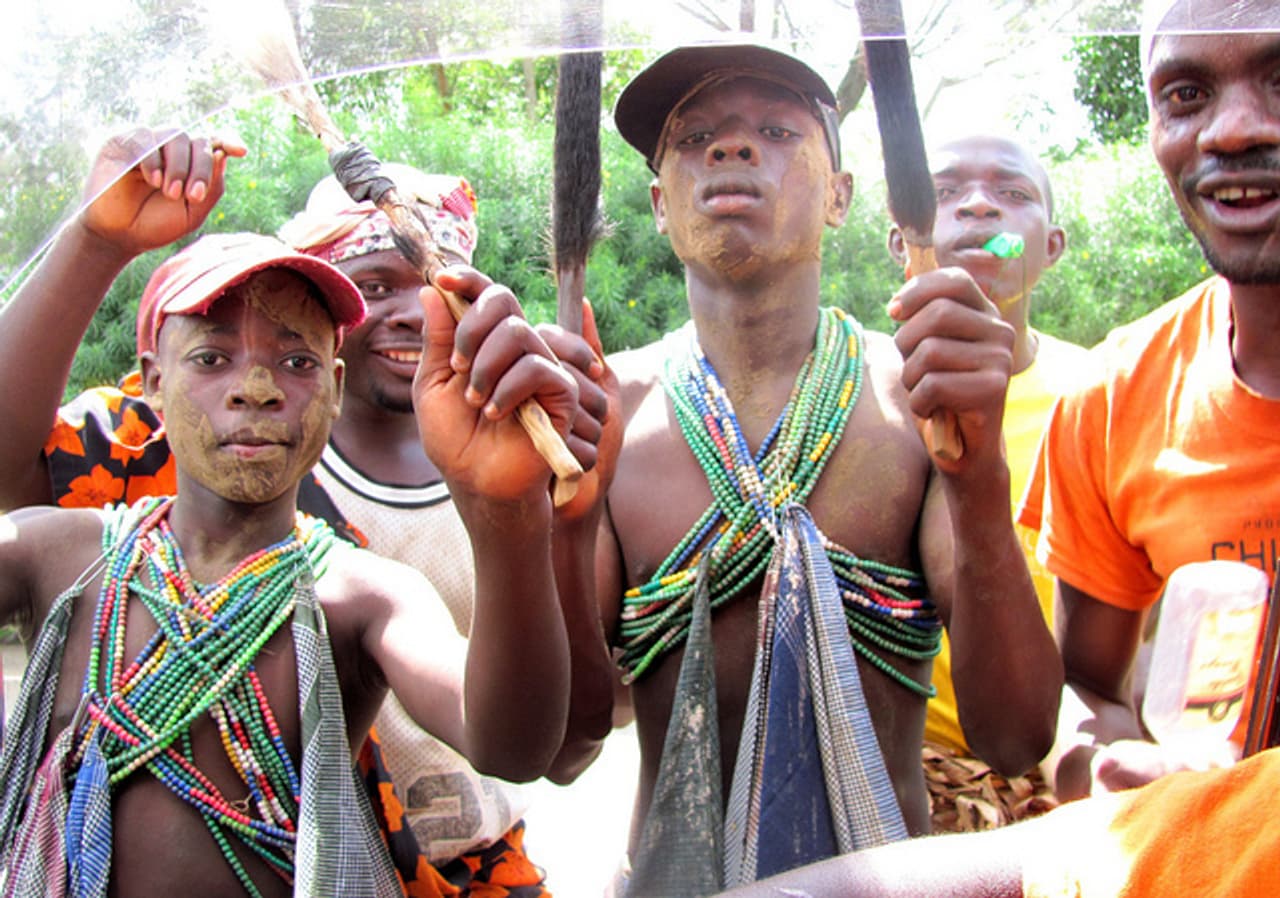
Analysis: Circumcision debated as African campaign expands
As San Francisco is denied a vote on banning circumcision of boys, US-backed mass circumcision programmes in Africa gather pace.
In July a judge stopped a proposed ballot on plans to outlaw the circumcision of male children in San Francisco. It is the latest in a raging debate over whether the practice of circumcision is justified. Preventing the transmission of the virus that causes AIDS is at its heart.
On the one hand people argue it is a quick and effective way of reducing HIV infection. Others say it should be classed, like female circumcision, as a form of genital mutilation.
Those in the first camp argue that circumcision helps protect against HIV because cells under the foreskin are vulnerable to the virus. When the foreskin is removed, the skin on the head of the penis becomes less sensitive and so less likely to suffer micro-cuts, thereby reducing the risk of infection.
Medical research ‘inconclusive’
Those in the second camp point out that research on whether circumcision reduces the likelihood of men contracting infections is inconclusive.
The British Medical Association’s line is that ‘the medical harms or benefits have not been unequivocally proven but there are clear risks of harm if the procedure is done inexpertly.’
Dr Antony Lempert, chair of the Secular Medical Forum, proposed a motion to the BMA annual congress conference in Cardiff this June, calling for doctors to stop performing ‘irreversible, clinically unnecessary surgery on the genitalia of non-consenting minors’. The motion was not debated.
‘Even if there were twenty such studies all showing statistically significant protection from a minor form of female cutting, there’s no way that any form of female circumcision would ever be promoted. Why the double standard?’
Stuart Worthington, Activist
But that didn’t stop NORM-UK — an anti-circumcision group— lobbying delegates in Cardiff in its first official demonstration. The group wants doctors to stop viewing the procedure as a minor and inconsequential op, in adults as well as children. Its members argue circumcision reduces penile sensation, might harm the immune system, reduces pheromone production and disrupts the body’s natural function.
Last year the Royal Dutch Medical Association adopted as official policy the line that the circumcision of boys is medically unnecessary and advocated a ‘strong policy of deterrence’.
Yet so far as Western health policy in Africa is concerned, the benefits of the procedure are incontrovertible.
In 2005, a randomized controlled trial of men in a South African township found that circumcision had helped reduce HIV infection by some 60%.
This trial caught some major players’ attention. The World Health Organisation, UN, Bill Gates and the Global Fund now all support circumcision as a preventative measure against HIV. With their financial backing, African countries have embarked on vast circumcision drives, aimed at adults and parents of newborn boys.
In July 2010 Bill Gates used a video from a Swaziland circumcision clinic to illustrate his call for mass circumcisions in Africa. A few months later the country launched its Soka Uncobe (Circumcise and Conquer) campaign. This aimed to operate on 80 per cent of the 18 to 49 year old male population by the end of 2011- a programme funded by the US to the tune of some $30 million.
‘This sort of major scale up of adult voluntary male circumcision programs has never been attempted with this size population or in this short a time frame,’ said a press release announcing the launch this January.
Events funded to encourage circumcision included a pool tournament funded by the Swaziland National Sports Council, which was only open to the circumcised.
A top football team publicly opted for the procedure and the polygamous Swazi king, Mswati III, issued a personal plea to his subjects to fight the ‘terrorist virus through circumcision‘.
Focusing on newborns
While the initial focus on the campaign was adult men, Swazi policymakers are now shifting their attention to newborns.
Data presented at the International Aids Society conference this July makes it hard to argue against Swaziland’s approach. Following a circumcision campaign in the same region of South Africa as the original trials, researchers found 20.0% of men who remained uncircumcised had HIV, compared with just 6.2% in those men who were circumcised.
The researchers observed that men who opted for circumcision tended to be younger and better educated. Despite this, they still calculated that circumcision reduced HIV prevalence by 55%.
They also reported positive results in every aspect of sexual health six months after circumcision. The subjects were 18% more likely to report overall satisfaction with intercourse and 6% less likely to complain of a lack of interest in sex.
However critics have questioned whether these improvements are a kind of placebo effect created by the publicity and pressure surrounding circumcision. And there is a substantial body of opinion that argues the Orange Farm results might not be able to be replicated elsewhere.
Other issues have also been raised. In the same month as Bill Gates aired his promotional video, the Swaziland Times revealed that the government had sat on research from 2007 showing that circumcised men had higher rates of HIV than uncircumcised.
A 2009 report, ‘Levels and Spread of HIV Seroprevalence and Associated Factors: Evidence from National Household Surveys‘ by USAID, also found that: ‘There appears to be no clear pattern of association between male circumcision and HIV prevalence. In 8 of 18 countries with data, as expected, HIV prevalence is lower among circumcised men, while in the remaining 10 countries HIV prevalence is higher among circumcised men.’
And 40 senior professionals endorsed an article in the American Journal of Preventative Medicine last year warning that the South African trials should not be used to justify mass circumcisions in different African populations.
The report quoted studies conducted since the South African trials showing that male circumcision is not correlated with lower HIV prevalence in some sub-Saharan populations but is correlated with increased transmission of HIV to women.
‘This new evidence warrants caution and further study before recommending circumcision campaigns. In addition, ethical considerations, informed consent issues, and possible increase in unsafe sexual practices from a sense of immunity without condoms must be weighed,’ it said.
Health officials in Malawi announced last year that, unlike its neighbours, it would not be adopting a policy of mass circumcision due to a lack of evidence. The chairman of the country’s National Aids Commission, Archbishop Bernard Malango, said no difference had been found in HIV infection rates between Muslim districts, where most men are circumcised, and Christian areas, where circumcision is not practised.
Dr Antony Lempert, chair of the Secular Medical Forum
Critics have also warned complication rates have not been properly assessed. The original trials reported low levels of complications. But, as with other aspects of the study, these may not be replicable across Africa. Rates of surgery-related complications observed in three randomised controlled trials of male circumcision for HIV prevention were 1.7 percent in Kenya, 3.5 percent in South Africa, and 7.6 percent in Uganda.
Despite the controversy – and Malawi’s stance – Swaziland-style campaigns are taking place all over Africa. Gates has also funded circumcision drives in Kenya and Zambia, which held a Mr Male Circumcision contest last year and has a target of 80% of newsborn boys to be circumcised by 2020. Zimbabwe has recruited a reggae star to back its Be Smart Get Circumcised campaign.
Botswana wants 80 % of its adult males circumcised in 5 years. Rwanda is aiming to circumcise two million men by 2013; Tanzania is targeting 2.8 million. If the same rates of surgery-related complications found in Uganda afflicted Tanzania, over 200,000 men would have problems.
A commentator in Malawi is now asking whether its officials’ public statements on circumcision had anything to do with the country failing to qualify for a Global Fund grant for HIV in 2012. Malawi’s application for ‘Round 10’ funding had included plans for mass circumcision, contradicting the officials’ statements.
Meanwhile in San Francisco the man behind the proposed vote, Lloyd Schofield, says his group is likely to appeal. If he succeeds, Africa’s circumcision programmes – and their wealthy backers – are likely to come under even closer scrutiny.
Neither will Norm-UK be supporting the African campaigns, despite the latest research from Orange Farm. Activist Stuart Worthington points to a 2005 study which showed a link between female circumcision and lower HIV rates.
‘Even if there were twenty such studies all showing statistically significant protection from a minor form of female cutting, there’s no way that any form of female circumcision would ever be promoted. Why the double standard?’
The HIV and sexual health charity, The Terrence Higgins Trust, also sounds a note of warning. Jason Warriner, governance director at the Trust, said: “In the UK there’s no evidence that circumcision reduces HIV prevalence amongst gay men. Condoms are the most effective way to prevent HIV infection.”




